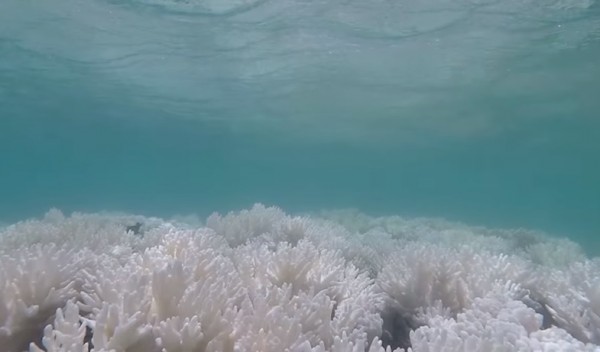By Ana Verayo, | March 30, 2016

New footage reveals massive coral bleaching at the Great Barrier Reef.
Massive coral bleaching is now ravaging the Great Barrier Reef in Australia, that is also putting this diverse marine ecosystem's world heritage status in danger, according to a new report by scientists and conservationists.
However last year, the United Nations' World Heritage Committee did not decide to place the reef on its "in danger" list that could spell potential disaster for the tourism of Australia.
Like Us on Facebook
Now footage that was just released this week reveals bright white reefs, indicating that they are severely bleached, along the far northern coast of Queensland. The United Nations Educational, Scientific and Cultural Organisation (UNESCO) says that if there is not enough progress, then their decision will be reviewed in 2017.
According to Janice Lough of the Australian Institute of Marine Science and the National Coral Bleaching Taskforce, this current situation is now "very bad" especially in the northern part of the Great Barrier Reef. She adds that water temperatures around the area have been warmer than normal for several weeks now and large parts of the reef have visible damage to it. There is also evidence that there are only four reefs in the north that are not yet affected by this bleaching.
According to World Wildlife Fund's Richard Leck, the northern part of the reef is now severely bleached, and it is at high risk of coral mortality. Leck says that he is certain that UNESCO will be monitoring this disaster as this unfolds. He also adds that it's still early to see how UNESCO will respond however, the first question for them would be, "how can this affect the world heritage values of the reef"?
Lough on the other hand, believes that this could soon become a reality since the northern part of the reef is the most pristine part, which is less affected by humans. She says that it is also too early to predict how much of the reef have been severely bleached and how many corals would die, as scientists are now monitoring the reef system closely that will span for the next seven months.
Lough also noted that it is also crucial that there are no other major events like a cyclone that have struck the northern region in the next coming years, which means that the reef will have time to recover and regenerate.
According to Greg Hut who is Australia's Environment Minister, the government can provide an update when it implements the Reef 2050 Plan with the World Heritage Center by the middle of next year. He says that there is already a briefing for senior officials for the next 18 months to schedule and implement the plan, which is ahead of schedule. This is also part of the regular five-year report for world heritage sites.
-
Use of Coronavirus Pandemic Drones Raises Privacy Concerns: Drones Spread Fear, Local Officials Say

-
Coronavirus Hampers The Delivery Of Lockheed Martin F-35 Stealth Fighters For 2020

-
Instagram Speeds Up Plans to Add Account Memorialization Feature Due to COVID-19 Deaths

-
NASA: Perseverance Plans to Bring 'Mars Rock' to Earth in 2031

-
600 Dead And 3,000 In The Hospital as Iranians Believed Drinking High-Concentrations of Alcohol Can Cure The Coronavirus

-
600 Dead And 3,000 In The Hospital as Iranians Believed Drinking High-Concentrations of Alcohol Can Cure The Coronavirus

-
COVID-19: Doctors, Nurses Use Virtual Reality to Learn New Skills in Treating Coronavirus Patients







